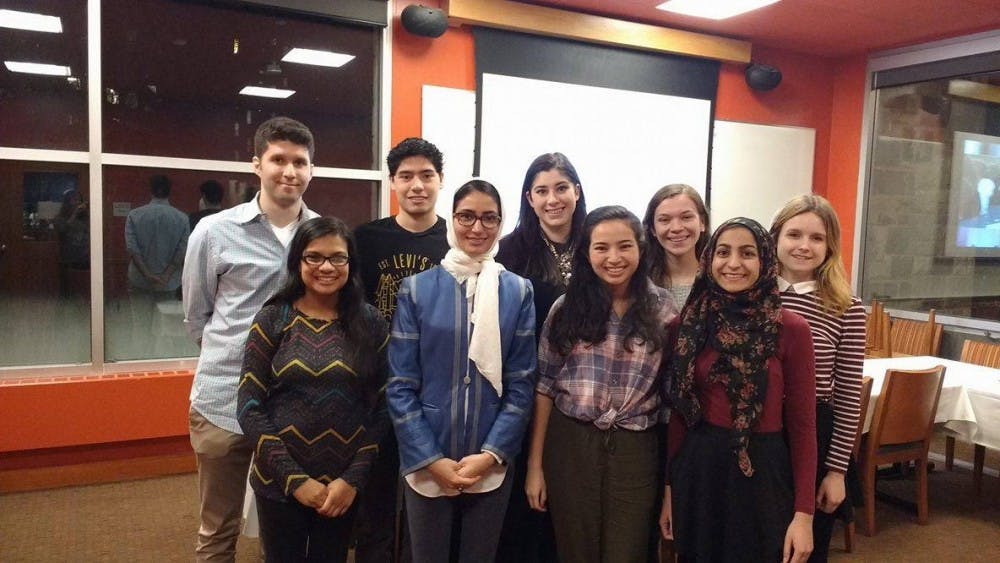In 2015, seeking to help Afghan girls learn coding skills and to empower them both financially and socially, Fereshteh Forough founded Code to Inspire, the first coding school for girls in Afghanistan.
At a dinner discussion in the Wilson College Private Dining Room on Friday, Forough shared her life’s journey, from being born as an Afghan refugee in Iran, to graduating with a master’s degree in computer science from the Technical University of Berlin, to finally founding CTI two years ago.
An after-school program for high school and college-aged young women, CTI currently provides an education in coding, website building, and mobile app development to 80 girls. Located in Herat, Afghanistan's third largest city, CTI provides a safe educational environment with laptops and internet access in a country where less than 10 percent of the population uses the Internet. Forough explained that safety is important for the program because of the political climate in Afghanistan, where it is dangerous for Afghan women to travel alone.
“The families of the girls, especially the fathers and brothers who make most of the decisions for the family, were initially hesitant to send girls to us — they thought the Internet was the devil!” Forough said. However, she explained that after families saw the facilities and met the mentors, most of them became CTI’s biggest advocates, thus helping the program gain wider recognition in the community.
CTI has garnered so much attention that Forough has begun thinking of expanding the program to other cities in Afghanistan, including Kabul. She explained that people from Egypt and other countries in Africa and the Middle East have requested her to found similar schools in their countries. The trouble, though, is that despite being registered as a 501(c)(3) nonprofit that receives funding from tech companies like Google, CTI still requires donations to keep running, according to Borough.
“We opened with $20,000, which is not a lot of money,” she explained.
Forough added that apart from teaching girls to code, CTI also helps them find jobs online. She explained that the technology industry is bigger in the capital city of Kabul than in Herat, making many of the jobs for which CTI students and graduates are qualified only available to them remotely.
“Women [in Herat] have no mobility, it’s often unsafe for them to travel alone to Kabul, and in our culture women don’t live independently in cities, they need a guardian,” Forough explained. She noted that working online erased the geographical and physical barriers to employment while helping women earn money in a safe environment.
Addressing the issue in Afghanistan of women lacking decision-making power in the family, Forough said that women bringing income into the home could help them gain more independence.
“I want to change the way Afghanistan is viewed by the world, and to show that women can add value to their households and to the community,” Forough said of her overarching goals for CTI.
Growing up as the fifth of eight children in a refugee family in Iran, Forough said that she often felt like she was viewed as an unwanted guest in her home country. She explained that the challenges she faced in her childhood gave her the strength to overcome many obstacles later in life. For example, as one of ten girls in an undergraduate computer science classes that had over seventy boys, Forough said she often received nasty letters or entered the classroom to find terrible words scrawled on the blackboard and walls.
“Boys found it hard to accept that a girl was better at coding than them,” she said, noting that when she was appointed a tutor for the class, many boys refused even to show up.
Even as a professor of computer science at Herat University, Forough says she has found that boys did not want to be taught by a female professor. She explained that her male students often did not attend class until they realized that they needed to go to class in order to do well.
Conversely, Forough noticed the girls in her class were often hesitant to ask questions for fear of ridicule. It was this phenomenon, she said, that first inspired her to start CTI.
Forough said she also wants CTI to address the societal trend by which women who graduated with a degree in computer science are less likely than men to be hired by employers. In discussing this trend, the educator cited her own example of being unable to find projects as a woman in her field. Many women become teachers in schools instead of entering the technology industry, she explained.
Through CTI, Forough hopes to make it more acceptable for women not only to study computer science but also to work in the tech industry and gain higher financial and social status through their work.
“I want to show that everyone can code, regardless of their gender,” Forough said.





